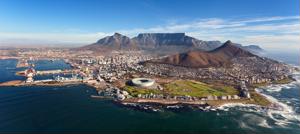Collaborating to save the global ocean

This is the basis for the discussions that will take place during a meeting entitled “Building International Partnership to Enhance Science-Based Ecosystem Approaches in Support of Regional Ocean Governance” to be held in Cape Town, South Africa from 27-28 November 2017. The meeting’s purpose is to strengthen collaboration among Large Marine Ecosystem (LME) Programmes, Regional Seas Programmes and Regional Fisheries – existing frameworks for regional management of ocean and coastal resources.
Andrew Hudson, Head of the Water and Ocean Governance Programme, UNDP, reflects on the challenges in ocean management and how a collective effort would be a step in the right direction: “SDG14 presents an ambitious and critically important mandate to move the world towards sustainable ocean use. Recognizing that ocean resources and processes don’t observe political boundaries, a range of regional ocean governance mechanisms have emerged over the years, some with overlapping mandates and boundaries. For the first time, this meeting brings many of these mechanisms together, with the aim to promote dialogue, exchange of good cooperation practice, and development of new partnerships. Working together, these regional mechanisms can accelerate progress on SDG14 implementation towards achieving the 2030 agenda.”
More than 130 participants from 40 countries will convene in Cape Town. They represent UN agencies, a variety of international organizations, the private sector, NGOs and representatives from national governments around the world to promote partnerships for sustaining the ocean.
Lisa Emelia Svensson, Director for Ocean, UN Environment, explained that "Regional Seas are the fundamental platform to build and strengthen the collaboration work with the Large Marine Ecosystem Programmes, Fisheries Bodies and other key stakeholders including the private sector. Sustainable management of ocean resources and the delivery of the Sustainable Development Goals are top priorities for UN Environment."

The GEF – The Global Environment Facility works through strategic investments and multi-stakeholder partnerships to tackle the planet’s biggest environmental issues. The GEF is the funding agency for LME:LEARN and the portfolio of projects it provides services to.
UNDP – The United Nations Development Program works to eradicate poverty and reduce inequalities through the sustainable development of nations. UNDP works in cooperation with other UN agencies, the GEF, international financial institutions, regional organizations, NGOs, the private sector and others to improve water and ocean management and sustain livelihoods at local, national, regional and global scales through effective water and ocean governance.
IOC-UNESCO – The Intergovernmental Oceanographic Commission of UNESCO promotes international cooperation and coordinates programmes in marine research, services, observation systems, hazard mitigation, and capacity development in order to understand and effectively manage ocean and coastal area resources.
UN Environment – The leading global voice on the environment. It provides leadership and encourages partnership in caring for the environment by inspiring, informing, and enabling nations and people to improve their quality of life without compromising that of future generations.
FAO – The Food and Agricultural Organisation of the United Nations leads international efforts to defeat hunger. Serving both developed and developing countries, FAO acts as a neutral forum where all nations meet as equals to negotiate agreements and debate policy.
More information on the meeting is available at /marine/capetown2017
FOR ADDITIONAL INFORMATION:
Natalie Degger
IOC-UNESCO
n.degger@unesco.org

























